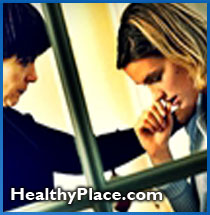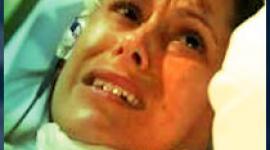Dealing with Trauma: 5 Beginning Steps
 Did you know that bad things that have happened to you in your life can cause or worsen psychiatric symptoms? There is more and more research that is confirming the strong connection between traumatic life events and psychiatric symptoms. If you feel this is true for you, medications may help you be able to do some work on this issue (you can decide about that) but there are other things you will need to do. Begin with the following.
Did you know that bad things that have happened to you in your life can cause or worsen psychiatric symptoms? There is more and more research that is confirming the strong connection between traumatic life events and psychiatric symptoms. If you feel this is true for you, medications may help you be able to do some work on this issue (you can decide about that) but there are other things you will need to do. Begin with the following.
-
When you are traumatized, you lose control of your life. You may feel like you still don't have any control over your life. You have to take back that control by being in charge of every aspect of your life. Others, including your spouse, family members, friends and health care professionals will try to tell you what to do. Before you do it, think about it carefully. Do you feel that it is the best thing for you to do right now? If not, you should not do it. It is important that you make decisions about your own life.
-
Talk to one or more people about what happened to you. Make sure it is a person or people who understand that what happened to you is serious and that describing it over and over again to another person is part of the healing process. It should not be a person who says something like: "That wasn't so bad." "You should just forget about it." "Forgive and forget." or "You think that's bad, let me tell you what happened to me." You will know when you have described it enough, because you won't feel like doing it anymore. Writing about it in your journal also helps a lot.
-
You may not feel close to anyone. You may feel like there is no one you can trust. Begin now to develop close relationships with another person. Think about the person in your life that you like best. Invite them to do something fun with you. If that feels good, make a plan to do something else together at another time--maybe the following week. Keep doing this until you feel close to this person. Then, without giving up on that person, start developing a closer relationship with another person. Keep doing this until you have close relationships with at least five people. Support groups and peer support centers are good places to meet people.
-
If you possibly can, work with a counselor or join a group for people who have been traumatized.
-
Develop a Wellness Recovery Action Plan so you can do what you need to stay well, and so you can effectively respond to symptoms whenever they come up.
Read the self-help book on relieving the effects of trauma that I wrote with Maxine Harris.
next: Developing Your Post-Crisis Plan
~ back to Mental Health Recovery homepage
~ depression library articles
~ all articles on depression
APA Reference
Staff, H.
(2008, December 7). Dealing with Trauma: 5 Beginning Steps, HealthyPlace. Retrieved
on 2026, March 3 from https://www.healthyplace.com/depression/articles/dealing-with-trauma-5-beginning-steps



